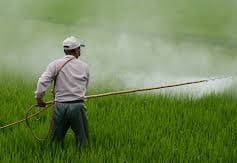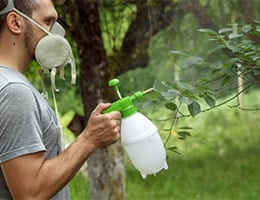 A herbicide is a chemical product that destroys unwanted weeds . It is a pesticide whose action usually concentrates on plant hormones to prevent specimens from growing.
A herbicide is a chemical product that destroys unwanted weeds . It is a pesticide whose action usually concentrates on plant hormones to prevent specimens from growing.
There are different kinds of herbicides. Some must be applied to the plants you want to eliminate, while others are spread on the ground to prevent the growth of weeds. Pesticides applied directly to the plant degrade in the short term; Those that are applied on the ground last longer.
Herbicides can also be divided into selective and non-selective. Selective herbicides affect a specific type of plant, eliminating unwanted ones without harming the rest of the crops . Non-selective herbicides , on the other hand, destroy a wide variety of plants. That is why they are usually used on roads or in industrial areas.
It is important to keep in mind that herbicides can cause serious damage to the environment, animals and people. On the one hand, their toxicity makes them substances that must be administered responsibly. On the other hand, by eliminating certain plants, birds are sometimes left without a food source or shelter. Herbicides can also alter soil fertility and, therefore, threaten agricultural productivity.
One of the most controversial herbicides is glyphosate . Defined as "probably carcinogenic to humans" by the World Health Organization ( WHO ), according to Greenpeace this chemical contaminates water and soil, reduces biodiversity and harms pollinators.
 Given the disruption that herbicides can cause to the environment and the threat it represents to so many species of animals, many people choose to make them at home, with reliable products, to keep their gardens in order while protecting their families. Weeds are a real problem; Removing them is not a whim nor does it respond to an aesthetic issue, but rather a necessary task so that the plants enjoy good health and develop properly.
Given the disruption that herbicides can cause to the environment and the threat it represents to so many species of animals, many people choose to make them at home, with reliable products, to keep their gardens in order while protecting their families. Weeds are a real problem; Removing them is not a whim nor does it respond to an aesthetic issue, but rather a necessary task so that the plants enjoy good health and develop properly.
One of the easiest options to prepare simply requires the use of boiling water . Yes, this ingredient is enough to kill the leaves and stems of annoying herbs that grow in cracks or that have invaded certain areas of the garden that we want to take advantage of. This method is very economical and easy to carry out, but it carries the risk of burns both on our body and on those around us. Needless to say, when applying water we must avoid splashing it on the plants and flowers we are trying to protect.
There is another option that is relatively easy to implement, although much more dangerous than the previous one: burning the weeds . This kills the grass immediately and will prevent new leaves from sprouting. To avoid burning other plants, it is recommended to purchase a tool made specifically for fire weeding, which allows heat to be applied directly to the weeds. If the area is prone to fires we must pay special attention.
Common table salt, also known as sodium chloride , is another product that we can use to combat the action of weeds. Simply dissolve one part salt in eight parts hot water and a little liquid soap; Once the mixture is made, we pour it into a spray bottle. This effective herbicide has been widely used throughout history. It is important to note that salt can negatively affect the soil, so it should only be applied to areas affected by grass.
